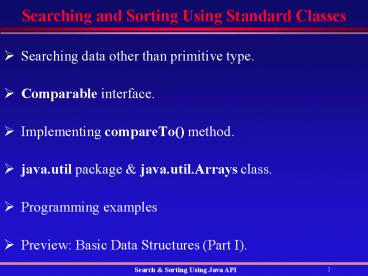Searching and Sorting Using Standard Classes - PowerPoint PPT Presentation
Title:
Searching and Sorting Using Standard Classes
Description:
So far, all the algorithms we have studied have been on array of integers. ... method object other of type Object is downcast to object s of type Student so ... – PowerPoint PPT presentation
Number of Views:19
Avg rating:3.0/5.0
Title: Searching and Sorting Using Standard Classes
1
Searching and Sorting Using Standard Classes
- Searching data other than primitive type.
- Comparable interface.
- Implementing compareTo() method.
- java.util package java.util.Arrays class.
- Programming examples
- Preview Basic Data Structures (Part I).
2
Searching and Sorting Real Data
- So far, all the algorithms we have studied have
been on array of integers. - However, in real life, there is rarely a need to
search or sort a collection of integers. What
are often encountered are records of say
students, bank accounts, books, etc., which have
many fields. - In java, these records are implemented as
objects. Thus, the question is, can we improve
these algorithms to handle array of objects? - Fortunately Java has made it very easy to do
this. All that is required is for a class to
implement the Comparable interface which has one
method named, compareTo(). Consider the
following example
3
Comparable Interface compareTo() Method
- java.lang package defines a Comparable interface
as follows - public interface Comparable int compareTo
(Object other) - Any class that implements the Comparable
interface must supply the compareTo method - The compareTo method is intended to sort objects.
A sorting algorithm will repeatedly call the
compareTo method e.g. - first.compareTo(second)
- depending on the return value (e.g. 1, 0, 1)
from compareTo method, the sorting algorithm
decides whether the objects are in correct order
or not (sorting) OR the particular object is
found or not (searching).
4
Example Implementing of compareTo() method
- Suppose we have a class Student and we want to
search record of a particular student. The
implementation of compareTo() method is as
follows - In compareTo() method object other of type Object
is downcast to object s of type Student so that
id of student to be search can be compare with id
of other student. If search is successful the two
ids matches and method returns 0.
public int compareTo(Object other)
Student s (Student) other if
(iDNumber lt s.iDNumber) return -1
else if (iDNumber gt s.iDNumber)
return 1 else return 0
class Student implements Comparable
private int iDNumber private String name
private double gPA ..
5
Example Implementing compareTo() (Contd)
public class Student implements Comparable private int iDNumber private String name private double gPA public Student(int iDNumber, String name, double gPA) this.iDNumber iDNumber this.name name this.gPA gPA public Student(int iDNumber) this(iDNumber,"",0.0) public String toString() return iDNumber"\t"name"\t"gPA public int compareTo(Object other) Student s (Student) other if (iDNumber lt s.iDNumber) return -1 else if (iDNumber gt s.iDNumber) return 1 else return 0 //other methods here
6
Example Implementing compareTo() (Contd)
import java.io.public class ComparableSearch public static intbinarySearch(Comparable a, int from, int to, Comparable v) if (from gt to) return -1 int mid (from to) / 2 int diff amid.compareTo(v) if (diff 0) // amid v return mid else if (diff lt 0) // amid lt v return binarySearch(a, mid 1, to, v) else return binarySearch(a, from, mid - 1, v) public static int search(Comparable a, Comparable v) return binarySearch(a, 0, a.length - 1, v) public static void main(String args) throws IOException BufferedReader console new BufferedReader(new InputStreamReader(System.in)) Student s new Student4 s0 new Student(955000, "Ibrahim", 3.5) s1 new Student(966000, "Amir", 2.0) s2 new Student(977000, "Talal", 2.4) s3 new Student(988000, "Usman", 2.5) for (int i 0 i lt s.length i) System.out.println(si) System.out.print("\nEnter ID Number to search for") Comparable v new Student(Integer.parseInt(console.readLine())) int j search(s, v) if (j ! -1) System.out.println("Found in position " (j1)) else System.out.println(v " not found")
7
Standard Sorting Searching Methods
- The Arrays class of the java.util package
implements binarySearch and a sorting method for
both numbers and comparable objects. - If you wish, you can call these methods rather
than your own implementations. - The following example shows how these methods may
be used.
import java.io.import java.util.Arrayspublic class StandardSearch public static void main(String args) throws IOException BufferedReader console new BufferedReader(new InputStreamReader(System.in)) int a ArrayUtil.randomIntArray(20, 100) ArrayUtil.print(a) Arrays.sort(a) ArrayUtil.print(a) System.out.print("\nEnter n number to search for") int j Arrays.binarySearch(a, Integer.parseInt(console.readLine())) if (j ! -1) System.out.println("Found in position " (j1)) else System.out.println("element not found")
8
Standard Sorting Searching Methods (Contd)
Student s new Student4 s0 new Student(977000, "Talal", 2.4) s1 new Student(988000, "Usman", 2.5) s2 new Student(999000, "Umar", 3.0) s3 new Student(955000, "Ibrahim", 3.5) Arrays.sort(s) for (int i 0 i lt s.length i) System.out.println(si) System.out.print("\nEnter ID Number to search for") Comparable v new Student(Integer.parseInt(console.readLine())) j Arrays.binarySearch(s, v) if (j ! -1) System.out.println("Found in position " (j1)) else System.out.println(v " not found")
9
Modified ArrayUtil Class
import java.util.Randompublic class ArrayUtil public static int randomIntArray(int length, int n) int a new intlength Random generator new Random() for (int i 0 i lt a.length i) ai generator.nextInt(n) return a public static void swap(int a, int i, int j) int temp ai ai aj aj temp public static void swap(Comparable a, int i, int j) Comparable temp ai ai aj aj temp public static void print(int a) for (int i 0 i lt a.length i) System.out.print(ai " ") System.out.println() public static Comparable copyArray(Comparable a, int size) String b new Stringsize if (size lt a.length) for (int i0 iltsize i) bi (String) ai return b































